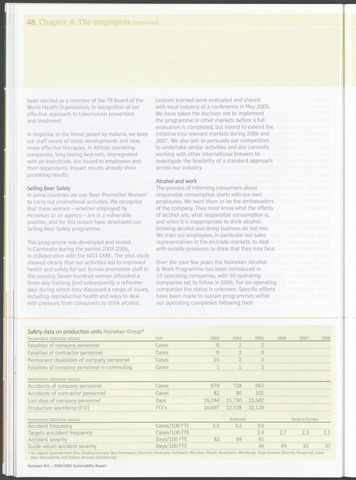■M
48. Chapter 4: The employees (continued)
been elected as a member of the TB Board of the
World Health Organisation, in recognition of our
effective approach to tuberculosis prevention
and treatment.
In response to the threat posed by malaria, we keep
our staff aware of latest developments and new,
more effective therapies. In African operating-
companies, long-lasting bed nets, impregnated
with an insecticide, are issued to employees and
their dependants. Impact results already show
promising results.
Selling Beer Safely
In some countries we use 'Beer Promotion Women'
to carry out promotional activities. We recognise
that these women - whether employed by
Heineken or an agency - are in a vulnerable
position, and for this reason have developed our
Selling Beer Safely programme.
This programme was developed and tested
in Cambodia during the period 2003-2005,
in collaboration with the NGO CARE. The pilot study
showed clearly that our activities led to improved
health and safety for our female promotion staff in
the country. Seven hundred women attended a
three-day training (and subsequently a refresher
day) during which they discussed a range of issues,
including reproductive health and ways to deal
with pressure from consumers to drink alcohol.
Lessons learned were evaluated and shared
with local industry at a conference in May 2005.
We have taken the decision not to implement
the programme in other markets before a full
evaluation is completed, but intend to extend the
initiative into relevant markets during 2006 and
2007. We also aim to persuade our competitors
to undertake similar activities and are currently
working with other international brewers to
investigate the feasibility of a standard approach
across our industry.
Alcohol and work
The process of informing consumers about
responsible consumption starts with our own
employees. We want them to be the ambassadors
of the company. They must know what the effects
of alcohol are, what responsible consumption is,
and when it is inappropriate to drink alcohol.
Drinking alcohol and doing business do not mix.
We train our employees, in particular our sales
representatives in the on-trade markets, to deal
with outside pressures to drink that they may face.
Over the past few years the Heineken Alcohol
Work Programme has been introduced in
33 operating companies, with 10 operating
companies set to follow in 2006. For six operating
companies the status is unknown. Specific efforts
have been made to sustain programmes within
our operating companies following their
Safety data on production units Heineken Group*
Unit
2003
2004
2005
2006
2007
2008
Fatalities of company personnel
Cases
0
2
2
Fatalities of contractor personnel
Cases
0
2
0
Permanent disabilities of company personnel
Cases
15
2
2
Fatalities of company personnel in commuting
Cases
1
1
2
Parameters (absolute values)
Accidents of company personnel
Cases
679
728
662
Accidents of contractor personnel
Cases
82
90
101
Lost days of company personnel
Days
16,244
15,730
13,582
Production workforce (FTE)
FTE's
16,697
22,728
22,129
Parameters (absolute values)
Achieved
Targets/Guides
Accident frequency
Cases/100 FTE
3.5
3.2
3.0
Targets acccident frequency
Cases/100 FTE
2.4
2.7 2.3 2.1
Accident severity
Days/100 FTE
82
69
61
Guide values accident severity
Days/100 FTE
46
49 42 37
No reports received from Brau Holding Germany (Bad Brambach, Chemnitz, Karlsruhe, Kulmbach, Miinchen, Plauen, Rosenheim, Wiirzburg), Volga Brewery (Nizhnhy Novgorod), Soboi
Beer (Novosibirsk) and Shikhan Brewery (Sterlitamak).
Heineken N.V. - 2004/2005 Sustainability Report

